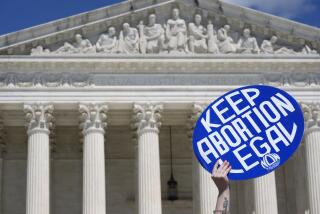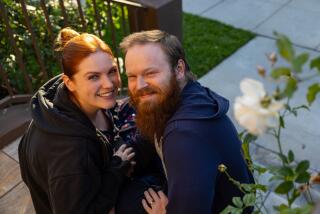Rewards as real as the risks for older moms
- Share via
Michele Borunda didn’t intend to become part of a risky trend when she gave birth at 43. She just wanted a baby with her new husband, who was six years younger than she.
She was already the mother of two teens -- a 16-year-old daughter and a 14-year-old son -- and figured the odds were against her conceiving naturally. So as soon as the couple returned from their Italian honeymoon, they began exploring fertility treatments.
“We went to this specialist in Beverly Hills,” Borunda recalled. “She’s probing and drawing blood and taking all these tests. We got a price list: $10,000 for this, another $5,000 for that. Then we found out, hey, I’m already pregnant.”
But the Woodland Hills couple’s joy was quickly tempered by the reaction of Borunda’s doctors, who saw the pregnancy as a minefield to be navigated.
“We had to sit down with a genetics counselor to talk about all the horrible things that could happen -- the birth defects, the complications. ‘We’re going to test you for this; there’s another test for that.’ It was so nerve-wracking, I cried my eyes out some days,” she said.
Then she gave birth to Shane, “the sweetest, most perfect baby you’ve ever seen.”
Now he’s 7 months old and she’s 44. And the doctors can get ready to start testing again, because the couple are trying for another child.
--
Maybe young women are having too much fun or working so hard launching careers they’re just not ready for procreating. Whatever the reason, twentysomething women are having fewer babies these days. And fortysomething moms are picking up the slack.
In California, the birthrate among women in their 40s has tripled in the last two decades, thanks to advances in reproductive technology, societal acceptance of single parents and that whole “40-is-the-new-30” way of life.
But according to an article in The Times on Monday by my colleague Mary Engel, doctors are alarmed by the childbearing shift, calling it a “risky trend” that can jeopardize mother and baby.
“Virtually every complication associated with obstetrics is increased with increased maternal age,” fertility specialist Dr. Richard Paulson told Engel. Doctors offer up a laundry list of risks: high blood pressure, diabetes, pre-term labor for the mom; spina bifida, Down’s syndrome, premature birth for the infant.
But the mothers I talked with said the worst thing about having a baby after 40 was not heartburn or an aching back, but the doctors’ gloom-and-doom warnings.
“It wasn’t the happiest pregnancy,” said Pam Richman, who gave birth at 45 -- without fertility treatments -- to a daughter, who’s now 3.
Richman had had several miscarriages since giving birth to her son eight years earlier. This time, “everything seemed to be going right,” she said, except that doctors wouldn’t stop reminding her of all that could go wrong. “I felt like I was always waiting for the other shoe to drop.”
Valerie Red-Horse Mohl was just about to turn 40 when she found out she was pregnant with her third child.
She was perpetually tired, her feet hurt, and she still hasn’t lost her pregnancy weight, although “baby Chelsea” is now in fourth grade.
But what she hated most was the way doctors “put the fear of God in you. ‘Your advanced maternal age,’ they keep saying. It makes you feel like you’re too old to do this.”
--It’s not that they don’t recognize the risks or appreciate their doctors’ concern. But these women know that giving birth is only the first, and maybe the least, of their challenges. Because most new mothers in their 40s are not starting families, but completing them. They know what they’re facing.
“It’s nine more years sitting on Little League benches,” said Borunda.
It’s hustling back from a college fair with your oldest child so you can get your middle kid to driving lessons, and still make the baby’s Gymboree class. It’s being mistaken for Shane’s grandma.
But it’s also rediscovering something so sweet, it leavens everything and everyone else in your family.
“You remember how much you loved your first kids?” asked Borunda. “They might be horrible teenagers now. But I look at the baby and think about them . . . ‘I used to kiss your feet and nuzzle your ear and hold you until you went to sleep just like I do him.’ ”
“Having a baby makes you fall in love with your teenagers again.”
--
To read past columns, go to www.latimes.com/banks
More to Read
Sign up for Essential California
The most important California stories and recommendations in your inbox every morning.
You may occasionally receive promotional content from the Los Angeles Times.









